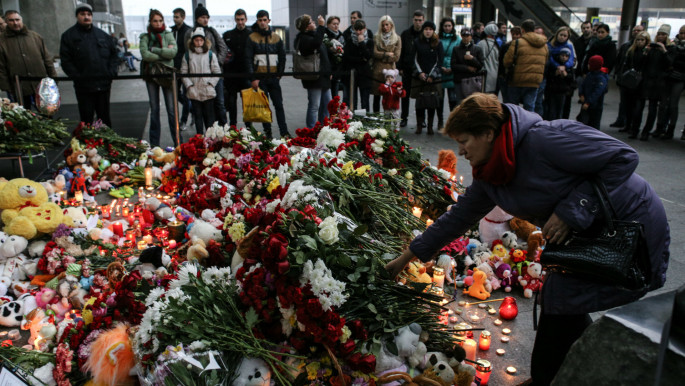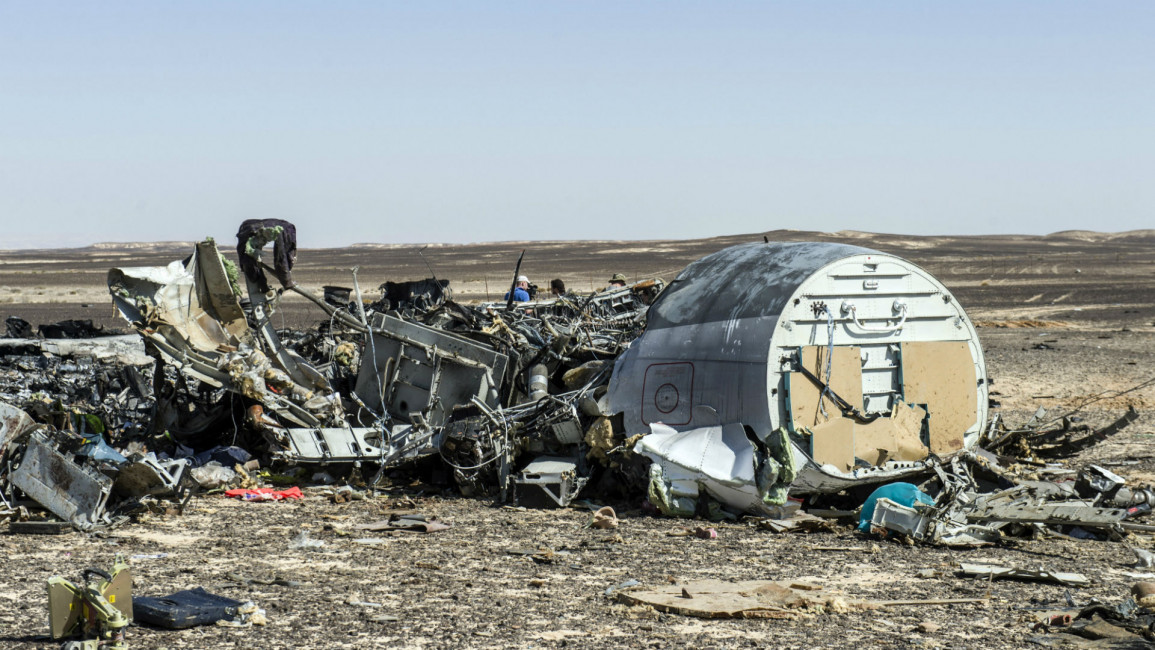Egypt's Sisi says allegations IS bombed plane are 'propaganda'
Egypt's Sisi says allegations IS bombed plane are 'propaganda'
Claims by airline officials that "external factors" caused the Sinai plane crash are "propaganda", according to Egyptian President Abd al-Fattah al-Sisi.
4 min read
Analysts have dismissed claims the plane could have been shot down by insurgents [Getty]
Egypt's president has dismissed claims that a Russian passenger jet was downed by a branch of the Islamic State group [IS] as propaganda, after the airline said the crash which killed all 224 people on board was due to "external" factors.
Analysis of the "black boxes", which could solve the mystery of what happened to the doomed jet, is expected to begin on Tuesday according to Egyptian officials. Russia's government commission overseeing the crash probe is also due to meet.
President Abd al-Fattah al-Sisi's remarks came as a top US intelligence official said it was "unlikely" IS was involved in the crash of the Kogalymavia Airbus A-321 over the Sinai peninsula on Saturday.
"When there is propaganda that it crashed because of IS, this is one way to damage the stability and security of Egypt and the image of Egypt," Sisi told the BBC.
"Believe me, the situation in Sinai - especially in this limited area - is under our full control," he said.
Both Cairo and Moscow have played down a claim by Egypt's IS branch that it brought down the plane which was bound for St Petersburg in Russia from the Red Sea resort of Sharm al-Sheikh.
And on Monday, the US Director of National Intelligence James Clapper said that while he could not rule out IS involvement, he thought it "unlikely".
"We don't have any direct evidence of any terrorist involvement yet," he said.
Investigators are examining all possible causes as they comb the remote crash site as part of an Egyptian-led probe into the disaster that also involves experts from Russia, Airbus, and Ireland, where the aircraft was registered.
'External action'
Senior Kogalymavia executive Alexander Smirnov said on Monday that "no technical failures" could account for why the Airbus 321 would have broken up in mid-air.
"The only explanation is some kind of external action," Smirnov told a news conference in Moscow, without elaborating, adding that the jet was in "excellent technical condition".
He said the firm had ruled out a technical fault or human error and that the plane had sustained "significant damage to its construction that did not allow it to continue the flight."
"The crew totally lost control and for that reason there was not one attempt to get in contact and report on the accident situation on board," Smirnov said. The plane was "flying out of control - that is, it wasn't flying, it was falling."
Alexander Neradko, head of Russia's aviation authority, criticised the airline's comments, saying they were "premature and not based on any real facts".
Russia said it hoped its crews would complete their search mission at the remote location on Monday evening, where so far investigators have found 12 segments of the plane's fuselage.
President Vladimir Putin has described the crash, Russia's worst air disaster, as a "huge tragedy".
"Without any doubt everything must be done to create an objective picture of events so that we know what happened and can react accordingly," he said.
Kremlin spokesman Dmitry Peskov said that in the investigation Moscow "cannot exclude any version" of events but warned against "guessing" the cause of the crash.
Analysts have dismissed claims the jet could have been shot down by IS-affiliated groups in the region if it was flying at its cruising height of 9,000 metres, but did not rule out that a bomb might have been planted on board.
'Meticulous work'
Relatives of those who died in the crash have begun the painful process of identifying their loved ones after a first plane delivered the remains of 140 victims to Saint Petersburg.
"The process of identification has begun. It is complex, meticulous work," Saint Petersburg deputy governor Igor Albin told journalists outside the crematorium where the remains are being stored.
A second plane is due to carry the rest of the remains to Russia.
Family members had already been providing DNA samples at a crisis centre set up near Saint Petersburg's Pulkovo airport, now the site of an impromptu memorial where people have brought flowers and cuddly toys to commemorate the victims, many of them children.
Analysis of the "black boxes", which could solve the mystery of what happened to the doomed jet, is expected to begin on Tuesday according to Egyptian officials. Russia's government commission overseeing the crash probe is also due to meet.
|
When there is propaganda that it crashed because of IS, this is one way to damage the stability and security of Egypt and the image of Egypt - Abd al-Fattah al-Sisi |
"When there is propaganda that it crashed because of IS, this is one way to damage the stability and security of Egypt and the image of Egypt," Sisi told the BBC.
"Believe me, the situation in Sinai - especially in this limited area - is under our full control," he said.
Both Cairo and Moscow have played down a claim by Egypt's IS branch that it brought down the plane which was bound for St Petersburg in Russia from the Red Sea resort of Sharm al-Sheikh.
And on Monday, the US Director of National Intelligence James Clapper said that while he could not rule out IS involvement, he thought it "unlikely".
"We don't have any direct evidence of any terrorist involvement yet," he said.
Investigators are examining all possible causes as they comb the remote crash site as part of an Egyptian-led probe into the disaster that also involves experts from Russia, Airbus, and Ireland, where the aircraft was registered.
'External action'
Senior Kogalymavia executive Alexander Smirnov said on Monday that "no technical failures" could account for why the Airbus 321 would have broken up in mid-air.
 |
|
| Mourners gather in Saint Petersburg [Getty] |
He said the firm had ruled out a technical fault or human error and that the plane had sustained "significant damage to its construction that did not allow it to continue the flight."
"The crew totally lost control and for that reason there was not one attempt to get in contact and report on the accident situation on board," Smirnov said. The plane was "flying out of control - that is, it wasn't flying, it was falling."
Alexander Neradko, head of Russia's aviation authority, criticised the airline's comments, saying they were "premature and not based on any real facts".
Russia said it hoped its crews would complete their search mission at the remote location on Monday evening, where so far investigators have found 12 segments of the plane's fuselage.
President Vladimir Putin has described the crash, Russia's worst air disaster, as a "huge tragedy".
"Without any doubt everything must be done to create an objective picture of events so that we know what happened and can react accordingly," he said.
Kremlin spokesman Dmitry Peskov said that in the investigation Moscow "cannot exclude any version" of events but warned against "guessing" the cause of the crash.
Analysts have dismissed claims the jet could have been shot down by IS-affiliated groups in the region if it was flying at its cruising height of 9,000 metres, but did not rule out that a bomb might have been planted on board.
'Meticulous work'
Relatives of those who died in the crash have begun the painful process of identifying their loved ones after a first plane delivered the remains of 140 victims to Saint Petersburg.
"The process of identification has begun. It is complex, meticulous work," Saint Petersburg deputy governor Igor Albin told journalists outside the crematorium where the remains are being stored.
A second plane is due to carry the rest of the remains to Russia.
Family members had already been providing DNA samples at a crisis centre set up near Saint Petersburg's Pulkovo airport, now the site of an impromptu memorial where people have brought flowers and cuddly toys to commemorate the victims, many of them children.

![Morocco Israel [Getty] Morocco Israel [Getty]](/sites/default/files/styles/image_330x185/public/media/images/AE22E2B5-5046-42CE-AA20-F9869E5A1E9B.jpg?h=d1cb525d&itok=9YeA_Yk1)

